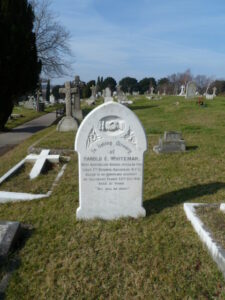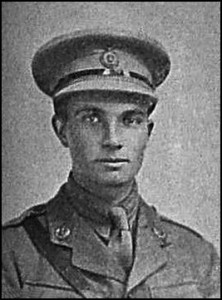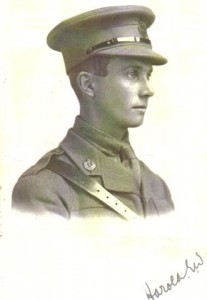Category: Military
Rank: 2nd Lieutenant
Regiment or Ship: 8th Bn Hampshire Regiment attached Royal Flying Corps
Date of Birth: 21 February 1895
Place of Birth: Janebrook Middle Swan Western Australia
Date of Death: 23 October 1916
Place of Death: Netheravon Wiltshire
Place of Burial / Memorials:
Bexhill Cemetery EF P 2
Photos and newspaper articles
Family Information
- Father: Ernest Whiteman
- Mother: Hannah Whiteman [nee Haddrill]
- 5 siblings
First World War Experience
Came to UK as a Rhodes Scholar and enlisted and commissioned. Whilst in training volunteered for the Royal Flying Corps. Killed in flying accident at 7 Reserve Squadron whilst in training.
After being named Rhodes Scholar for 1915, he sailed for England, but deferred starting a law degree at Oxford until he’d completed his war service. He joined the Army, attached to the Inns of Court Training Corps. He later received a commission in the Hampshire Regiment. The regiment was under orders to proceed to France, but the order was cancelled and the regiment was ordered to proceed to India. The prospect of garrison duty in India bitterly disappointed Harold, who had for some time felt he was not facing the same risks as other former school fellows.
Soon afterwards he transferred to the Royal Flying Corps and, after passing a course of ground instruction at Reading, was posted to the elementary flying training school at Netheravon in Wiltshire.
He began flying training in September 1916 and had completed five hours dual instruction in a Maurice Farman ‘Shorthorn’ aircraft when his instructor sent him up to fly solo.
The aircraft was Shorthorn, serial number A949. Twenty five minutes into this flight the aircraft nose-dived to earth.
At the inquest Captain Collins stated that he was quite a capable pilot. The aeroplane had dived from a great height to within 150 feet of the ground, when it turned and nose-dived to earth. Harold was injured but died in hospital later that day.
His early education was at Middle Swan Primary School. At 13, he joined Guildford Grammar School. His all-round ability soon became apparent as he excelled academically, at sport and in the military and cultural life of the school.
He was school captain for three years, founded and was president of the School Debating Society, captained the School XI Cricket and Shooting teams, the 1st XVIII Football team from 1911-1914, was a member of the Athletics team 1911-1913, Cross Country team 1910-1911 and Shooting team 1910-1913.
He also held the rank of Lieutenant in the Guilford Grammar School Cadet Corps.
In 1914 he completed first year Arts (Maths, English, Latin, Greek, French and Logic) at the University of Western Australia. He also joined the teaching staff at Guildford, where he taught second form boys and was a junior house master.
After being named Rhodes Scholar for 1915, he sailed for England, but deferred starting a law degree at Oxford until he’d completed his war service. He joined the Army, attached to the Inns of Court Training Corps. He later received a commission in the Hampshire Regiment. The regiment was under orders to proceed to France, but the order was cancelled and the regiment was ordered to proceed to India. The prospect of garrison duty in India bitterly disappointed Harold, who had for some time felt he was not facing the same risks as other former school fellows.
Soon afterwards he transferred to the Royal Flying Corps and, after passing a course of ground instruction at Reading, was posted to the elementary flying training school at Netheravon in Wiltshire.




